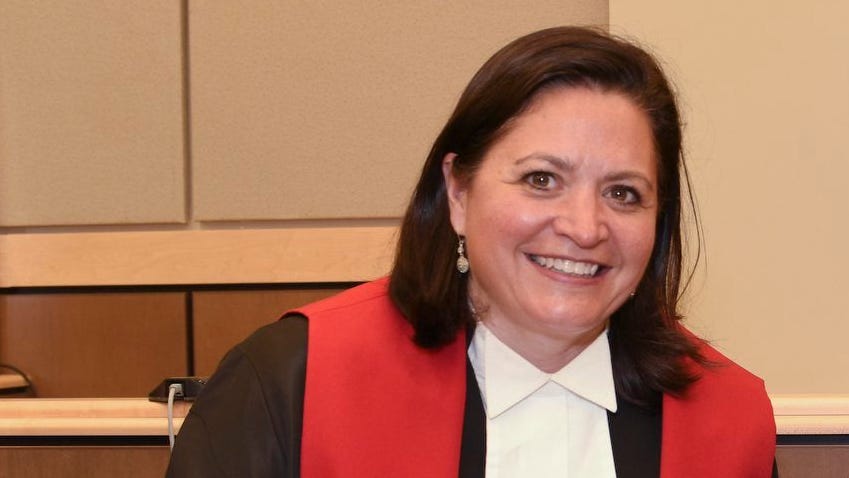Ousted forestry prof appeals lawsuit decision
Rod Cumberland argues chief judge of King’s Bench erred in decision on his wrongful-dismissal lawsuit Maritime College of Forest Technology
Rod Cumerland is turning to the province’s top judicial authority to vary the result of his wrongful-dismissal lawsuit to add “moral, aggravated and punitive damages” to the limited severance a judge awarded him.
Cumberland had worked as an instructor at the Maritime College of Forest Technology in Fredericton from 2012-2019 but was fired.
He sued, arguing he was punished for his vocal opposition to the use of glyphosate as an herbicide commonly used by New Brunswick forestry sector players, notably J.D. Irving Ltd.

The civil trial was held in the Court of King’s Bench at the Burton Courthouse last fall before Chief Justice Tracey Deware.
In a decision issued May 2, DeWare ruled it was for his poor treatment of students and insubordinate tone with managers that Cumberland was terminated from his position at the college, not his views on glyphosate.
However, she found the college didn’t give Cumberland sufficient warning about his negative behaviours and how they were putting his job in jeopardy.
Given that failure, DeWare wrote in her decision, Cumberland was entitled to seven months’ severance pay in lieu of notice.
Despite the partial victory, Cumberland filed a notice of appeal with the New Brunswick Court of Appeal on June 1, looking to bump up the severance award and arguing DeWare erred by declining to award additional damages.
“The appellant asks that the decision be varied by allowing the appellant’s claim for moral, aggravated and punitive damages, and increasing the plaintiff’s claim for reasonable notice of dismissal to 12 months,” the notice of appeal states.
The document lists numerous grounds of appeal, contending DeWare erred in several respects in her decision.
“The trial judge rendered an error of law by failing to consider that the termination letter included numerous patently baseless allegations of just cause as a relevant factor of bad-faith treatment on dismissal,” it states, adding that the trial judge also neglected to consider that the college failed to investigate those allegedly baseless claims.
Cumberland’s notice of appeal also alleges DeWare should have considered how the college built “a secret discipline file” against him for months without actually investigating any of the allegations, arguing that also pointed to bad-faith treatment.
Paul Champ, Cumberland’s lawyer at trial and who prepared the notice of appeal, also includes among the grounds of appeal the notion that the chief judge overlooked that the college actively interfered with his client’s efforts to secure new employment after his dismissal.
The notice of appeal also alleges DeWare made an erroneous finding of fact that other instructors at the college had made complaints about Cumberland’s behaviour toward them.
It also contends the trial judge was wrong in finding that Cumerland created “a toxic atmosphere” at the college, arguing it was academic director Gareth Davies who did so.
No date has been set yet for the appeal to be heard.
In a post last month in the Friends of Rod Cumberland group on Facebook, Cumberland announced he was pursuing an appeal, even as he acknowledged the chances of success weren’t great.
“We have contemplated and prayed about where we go from here. We knew going in that the history of wrongful dismissals in NB is dismal, and our verdict once again bears this out and therefore, the odds of changing much by appeal may be an uphill climb,” he wrote.
At trial, court heard Cumberland’s conflicts with the college started in 2017 when a new executive director, Tim Marshall, was appointed to the position.
That brought about new approaches to how the college operated, and Cumberland wasn’t shy about expressing his displeasure about it.
Things got more contentious in 2018 with the creation of a new management position - academic director - for which Cumberland applied. He didn’t get the job, and he wasn’t happy with who did: Gareth Davies.
Cumberland perceived that Davies landed the job due to a friendship with Marshall.
“The 2018-2019 academic year was extremely tumultuous. Mr. Davies struggled in his role as academic chair and had difficulties managing his relationship with Mr. Cumberland,” DeWare wrote.
“Mr. Davies received complaints directly from students concerning Mr. Cumberland’s conduct which he did not discuss with Mr. Cumberland as he found their interactions very stressful.”
It was in that respect where the college slipped up, the chief judge said, as management didn’t express its concerns about Cumberland’s conduct to give him a chance to correct it.
As such, she found he should have been awarded severance equal to a seven-month notice period, so she awarded Cumberland $48,644.57, plus $6,700 in costs.
While Cumberland ultimately argued industry insiders had pulled strings at the college to force him out over his criticisms over glyphosate use in New Brunswick forests, the King’s Bench chief judge said that wasn’t what caused his undoing at the institution.
“Mr. Cumberland was terminated from his position with the college as a result of his attitude and behaviours which rendered his continued employment impossible,” she wrote in the May 2 decision.
“Mr. Cumberland was not dismissed as a result of his views on glyphosate. Mr. Cumberland’s termination was not engineered by J.D. Irving Ltd.”
Don MacPherson can be contacted at ftonindependent@gmail.com.





I guess he did, that stuff is not healthy in any way for any human or any animal